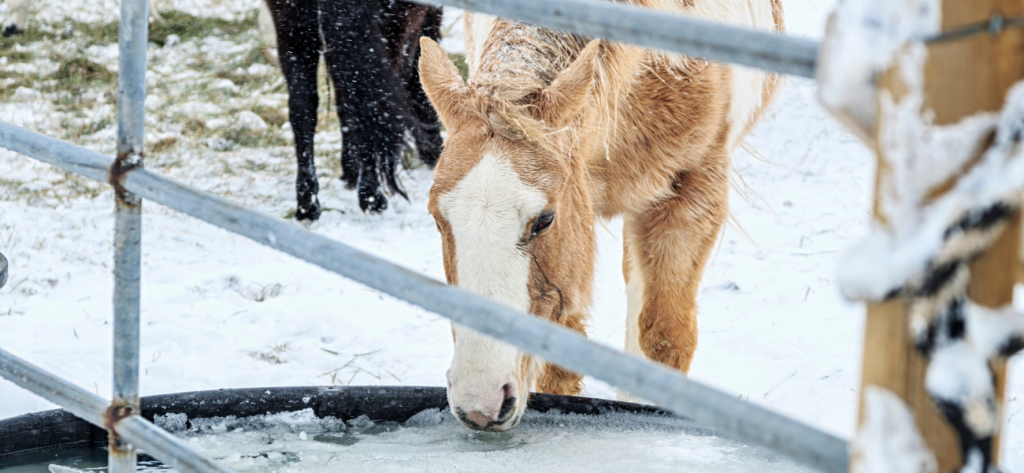Blog, Equine, Uncategorized
The Importance of Keeping Horses Hydrated in Winter: Why it Matters and How to Do It Right
The Importance of Keeping Horses Hydrated in Winter: Why it Matters and How to Do It Right
When winter sets in, many horse owners focus on providing warm bedding, proper shelter, and appropriate food to help their animals thrive. However, one crucial aspect of horse care that often gets overlooked in the colder months is hydration. Keeping horses properly hydrated during the winter is just as vital as during the summer months, and understanding why hydration is important, as well as how to ensure your horse is drinking enough water, can make a significant difference in their health and performance.
Why is Hydration Important in Winter?
Preventing Dehydration: Dehydration in horses can have serious consequences, even in the winter. While horses may sweat less in colder temperatures, they still need sufficient water intake for proper digestion, circulation, joint lubrication, and temperature regulation. Inadequate hydration can lead to dehydration, which in turn can cause lethargy, colic, or even kidney damage. Since horses tend to drink less in winter due to the cold water, dehydration is a risk that needs to be actively managed.
Supporting Digestive Health: Water is essential for the digestive process. Horses rely on water for the digestion of fiber, and during the colder months horses eat more dry fiber like hay than the moisture rich grass they eat in the summer. If a horse doesn’t drink enough water to help break down this dry material, it could result in digestive upset, including impaction colic, a painful and sometimes life-threatening condition.
Maintaining a Healthy Coat and Skin: Winter conditions can be tough on a horse’s skin and coat. Without enough water, horses can experience dry, flaky skin, and their coats may become dull and brittle. Hydration helps maintain the health of their coat and overall skin integrity, ensuring that they can better withstand the colder temperatures and remain comfortable.
Keeping Muscles and Joints Healthy: Water plays a significant role in joint lubrication and muscle function. Proper hydration helps prevent stiffness, joint pain, and muscle cramps.
Why Might Horses Drink Less Water in Winter?
Several factors contribute to reduced water consumption during the winter months:
- Cold Water: Horses may be reluctant to drink cold water, as it can be uncomfortable for them. They might avoid drinking water if it’s too chilly, even if they need it.
- Reduced Exercise: During winter, horses often spend more time indoors, in stalls, or are exercised less frequently, leading to reduced thirst. Less physical activity means their bodies need less water for cooling purposes, but they still need enough to maintain normal bodily functions.
- Increased Hay Consumption: During the colder months, horses generally consume more hay, which is dry. This increases the need for water to aid in digestion, but it doesn’t necessarily prompt horses to drink more. Without sufficient water, it can cause dehydration or digestive issues.
- Snow and Ice: Horses may prefer eating snow instead of drinking water. While eating small amounts of snow can provide some moisture, it’s not an adequate substitute for drinking water.
How to Ensure Proper Hydration in Winter
- Offer Warm Water: One of the best ways to encourage horses to drink more during the winter is by providing warm water. Cold water is often unappealing to horses, especially when temperatures drop significantly. Using a heated water trough or adding warm water to their water supply will make drinking more attractive and encourage them to drink more regularly.
- Provide Fresh Water Regularly: Water should be fresh and clean at all times. Horses are more likely to drink water if it’s fresh and free of debris, ice, or contaminants. Make it a habit to check and refill water containers frequently to ensure they are not blocked by ice or dirt.
- Use Electrolytes to Encourage Thirst: Adding balanced electrolytes to your horse’s feed or offering salt blocks can encourage them to drink more water. The added salt can increase thirst and promotes better hydration.
- Monitor Water Intake: Pay close attention to your horse’s water consumption. Regularly track how much water your horse is drinking and seek veterinary advice if you have concerns about their hydration levels.
- Offer Wet Feeds: Incorporating wet feeds like soaked hay cubes, beet pulp, or mash into your horse’s diet can help increase their water intake. These can be especially beneficial if your horse is not drinking enough water on their own.
Signs of Dehydration
It’s important to be able to identify the signs of dehydration in your horse so that you can act quickly to address the issue:
-
- Dry, tacky gums
- Sunken eyes
- Lethargy or weakness
- Decreased urination
- Loss of skin elasticity (when pinching the skin, it doesn’t snap back quickly)
If you suspect your horse is dehydrated, it’s essential to consult with a veterinarian immediately. Dehydration can be a serious condition that requires treatment, including intravenous fluids.
Conclusion
When winter sets in, many horse owners focus on providing warm bedding, proper shelter, and appropriate food to help their animals thrive. By providing warm water, ensuring fresh water supplies, offering salt to encourage thirst, and keeping your horse active, you can help prevent the complications associated with dehydration and ensure your horse remains healthy and comfortable throughout the colder months. Winter may present unique challenges for horse owners, but with proactive hydration management, you can keep your horse thriving all year long.
https://www.vets-now.com/colic-dehydration-horses/
https://thehorse.com/179261/winter-horse-care-hydration/

